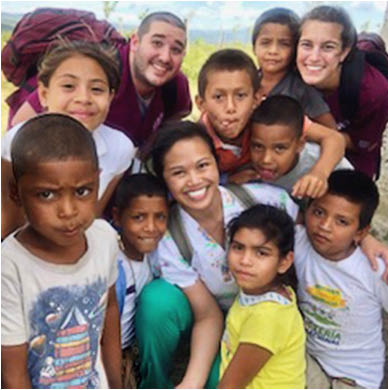As a second-year medical student at the Edward Via College of Osteopathic Medicine, I had the opportunity to participate in a medical outreach trip to Tegucigalpa, Honduras, in July 2018. I had previously visited Tegucigalpa in January 2017 on a medical education trip geared toward children. That experience was so positive that I had to go back. To this day, my second outreach trip serves as a reminder of why I sacrifice long days and longer nights to study for medical exams. Here are my four takeaways from that trip.
1. Patients may travel hours for medical care, sometimes on foot
While in Tegucigalpa (Figure), I encountered a grandmother and her three grandsons, aged 4, 6, and 9. After finishing with my last patient at the JMA Women’s Clinic, I was bringing a table to the storage room when I met this family. I found some balloons that we had packed, blew them up, put eyeball stickers on them, and offered them to the three boys. One of the boys, Anayer, hid his face in his grandmother’s shirt and timidly peeked out at me. After I gave his two brothers balloons, he finally trusted me and reached his hand out to retrieve one himself. I spoke to my colleague who attended them, and she told me that they had traveled on foot from more than 1 hour away. As they were leaving, I gave the boys all of the snacks I had in my bookbag for their trip home. Their faces lit up with surprise and gratitude.

Figure | Jennifer Camia, BS, MS (center), in Tegucigalpa, Honduras.
2. Patients place great trust in their care providers
During my outreach trip, first-time Honduran mothers would hand me their newborn babies, and I had no choice but to exude confidence and mask my nervousness. Most patients were very willing to be vulnerable around me, even though I did not speak their language. As a budding physician, I found it helpful to ask questions when in doubt and to seek help from the seasoned preceptors and interpreters to guide the clinical-thinking process and deliver the best medical care possible.
3. Learning some of the native language is key
When participating in an outreach trip, mastering some key phrases in the native language goes a long way. Although an interpreter is often present for each patient interaction and the patient’s response will be in his or her native tongue, it is important to show that you are trying to connect with the patient on a more personal level. Here are some words and phrases that I found to be valuable.
- Please and thank you
- What medical problems are you having?
- I hope you feel better soon.
- Where is the nearest bathroom?
4. Osteopathic manipulative medicine skills may be useful
During a medical mission, it is sometimes necessary to think outside the box and to act creatively and unconventionally. For example, I never once stepped foot in a hospital during my trip to Tegucigalpa. Churches located deep within the busy city or perched high on mountaintops opened their doors so that we could hold medical screenings. Many people we treated did not have washers or dryers; instead, they washed their clothes by hand, usually outdoors near a water pump. Some did not have cars or bikes, so they gracefully carried their groceries on top of their head. Some children could not recall their last bowel movement.
For these reasons, I found it beneficial to provide some osteopathic manipulative medicine (OMM) techniques for leg cramps, neck pain, and mesenteric release for constipated patients. We could only pack so much medication, so once our supply ran out, patients with muscle complaints received OMM. Even for providers who are not osteopathically trained, OMM skills can certainly be helpful in settings of limited resources.
CONCLUSION
After arriving back in the United States, I realized that both my work at home and abroad could benefit from an improved knowledge of Spanish. These Spanish-speaking skills would have helped me to better connect and understand patients in Honduras without having to heavily rely on an interpreter. I recently had an opportunity to speak basic Spanish to a handful of US patients while doing my pediatric rotation in the small rural town of South Boston, Virginia. Currently, I keep up with my Spanish by using Duo Lingo and participating in weekly online tutor sessions with a Spanish teacher. My goal is to have my Spanish-speaking skills proficient enough to one day comfortably complete a full patient examination without the need for an interpreter.



